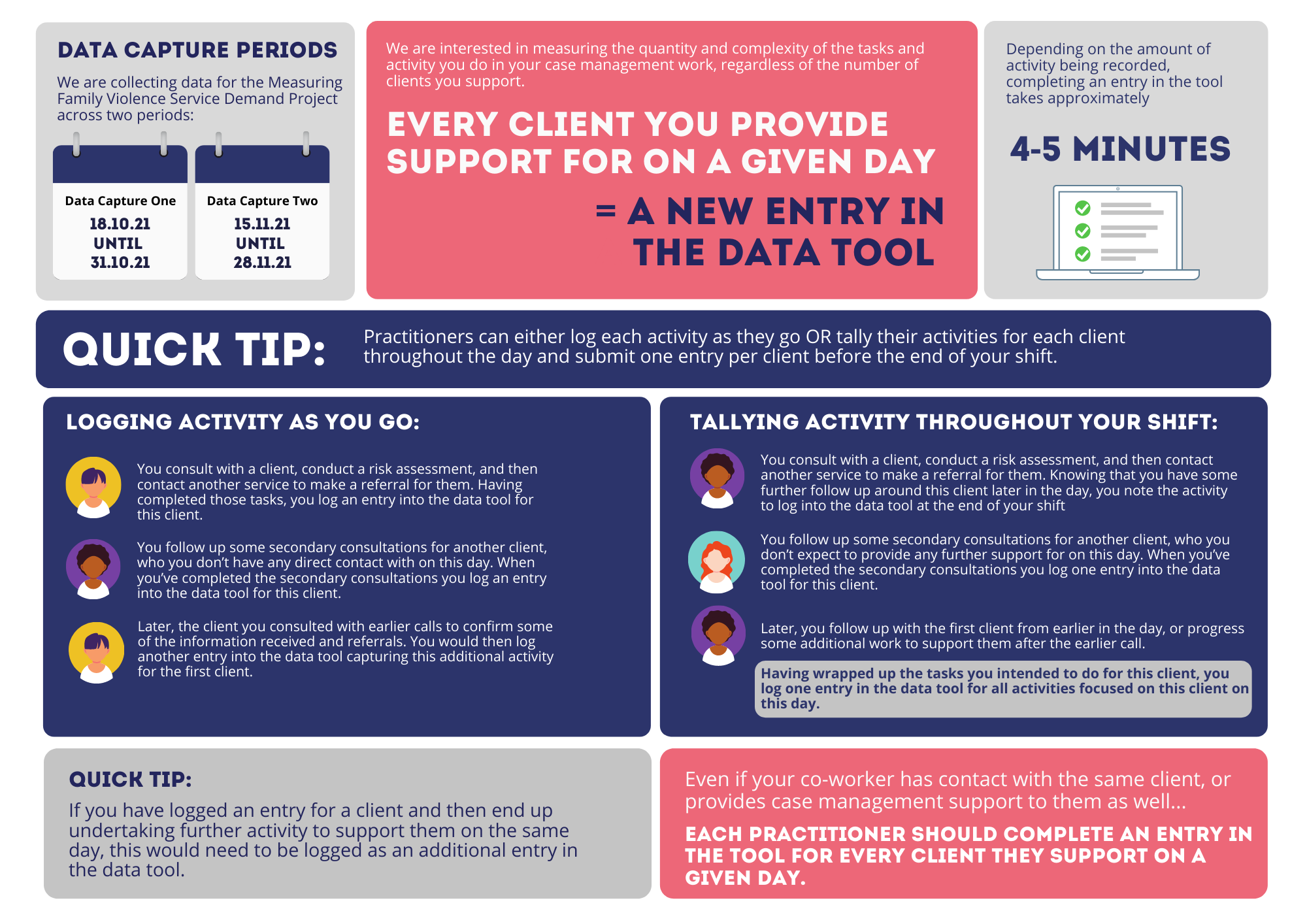Building on our 2021 state budget submission, Safe and Equal (formerly DV Vic and DVRCV) has contracted Dr. Kristin Diemer from the University of Melbourne to develop a data collection methodology for the sector to measure service demand for specialist FV services.
This data will support advocacy for increased, adequate, and sustainable funding from government for specialist services which have faced significant structural deficits for some time.
The data collection will involve case management staff within member services using a tool that has been developed to record service data relating to their work during two two-week data collection periods.
The data collection periods are:
- Snapshot one: 18.10.21 – 31.10.21
- Snapshot two: 15.11.21 – 28.11.21
Following these snapshot data collection periods, the project team will analyse the data and report back to members the key insights.
Data capture results
Data Capture One
- At the end of the two-week snapshot, 3,500 records had been logged through the survey tool.
- These were generated by staff across 19 services, with 15 services actively participating throughout the period.
- The average time taken to complete the survey was just over 4 minutes.
- 45% records came from regional, rural or remote services, and 54% from urban services.
- 84% of records related to an existing client, adding to their existing support period, and 6% relate to new support periods for existing clients.
- Only 4% of records related to new clients, and we’re anticipating the service-level data will tell us more about this cohort.
- 36% of activities have involved a secondary consultation.
Data Capture Two
- At the end of the two-week snapshot, 2,246 records had been logged through the survey tool from 15 participating services.
The total number of records logged from both data capture periods is 5,910.
Why are we doing this?
The aim of this project is to obtain the data we need for strengthening our business case to the government for increased funding for the specialist sector in next year’s state budget. This is a key priority for us on behalf of member services and we have had feedback from Treasury that without this data we are not going to move the dial on the government’s approach to this funding – which we all agree is not adequate or sustainable.
We need to tell the story of unmet demand, including the increasing complexity and severity of cases, and the impact this has for victim survivors and the workforce. This data and improved data infrastructure will be an invaluable advocacy tool for the sector into the future.
Resources to support practitioners and member services
Family Violence Data Helpdesk
The FV Data Helpdesk (ellalonghurst@safeandequal.org.au) is available for services and practitioners to resolve questions and issues, and provide feedback.
Data Collection Tool Cheat Sheet and Frequently Asked Questions resource
This cheat sheet will provide an outline of the steps required to log a consult in the tool. We have also answered frequently asked questions from services and practitioners and provided a glossary to accompany the data collection tool.
Data Collection Tool Infographic

Explainer video: How to use the data collection tool
We know this project is a heavy lift for our member services and front-line workers and could not be coming at a more challenging time. We also know that we do not have the option to delay this critical work. Our sector has been underfunded for decades, and demand is ever-increasing as the pathways into specialist services continue to increase. We know this is leading to greater risk and vulnerability for victim survivors in the community, driving burn out for our valuable specialist workforce and making it difficult for services to provide the specialist support so desperately needed.